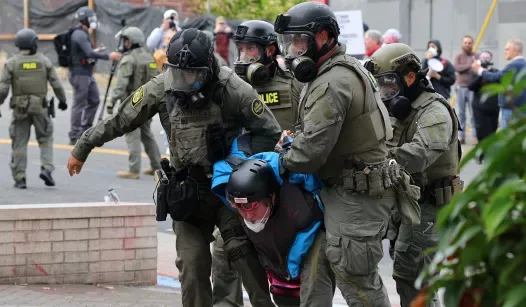In recent weeks, the standoff involving the National Guard has highlighted a troubling dynamic within American politics. The underlying incentive structure appears misaligned, leading to increased tensions and potential conflicts that could reverberate throughout the political landscape.
At the heart of this standoff is a clash of priorities between state and federal authorities. As states grapple with pressing issues such as public safety, health crises, and economic recovery, the role of the National Guard has become increasingly pivotal. However, differing interpretations of their deployment and authority have sparked disagreements that threaten to escalate into broader political confrontations.
One of the core issues at play is the perception of the National Guard’s role in civil matters. Traditionally viewed as a reserve force that supports local law enforcement during emergencies, the National Guard’s involvement in political disputes raises questions about its intended purpose. Critics argue that using the Guard in political contexts undermines its legitimacy and can lead to a dangerous precedent where military forces are deployed to settle civil disagreements.
Moreover, the current political climate exacerbates these tensions. Partisan divides have deepened, with both sides of the aisle leveraging the National Guard’s presence to reinforce their narratives. This politicization of the Guard not only complicates its operational effectiveness but also risks alienating communities that rely on these men and women for support during crises.
In addition to the immediate implications of the standoff, there are broader concerns about how this situation reflects the state of American democracy. When military forces are drawn into political conflicts, it raises alarms about the erosion of civil governance and the potential for authoritarianism. The very fabric of democratic institutions relies on the separation of powers and the assurance that military force will not be used against citizens.
The misalignment of incentives is evident in the way political leaders respond to the standoff. Instead of seeking collaborative solutions that prioritize public safety and community well-being, many are resorting to rhetoric that further entrenches divisions. This approach not only jeopardizes the National Guard’s mission but also risks inciting unrest among citizens who may feel marginalized or threatened by the government’s actions.
To navigate this complex landscape, it is crucial for leaders at all levels to re-evaluate their strategies. Engaging in open dialogue with communities and fostering transparency about the National Guard’s role can help rebuild trust. Additionally, prioritizing non-partisan solutions that address the root causes of conflict can pave the way for a more unified approach to governance.
Ultimately, the National Guard standoff serves as a stark reminder of the challenges facing American democracy today. By addressing the incentive structures that fuel political conflict, there is an opportunity to foster a more constructive and collaborative political environment. As citizens, it is essential to advocate for a political discourse that values dialogue over division, ensuring that the National Guard can fulfill its mission without becoming a pawn in political gamesmanship.
As we move forward, let us remain vigilant in our efforts to protect the integrity of our democratic institutions and the principles that underpin them. The stakes are high, and the choices we make today will shape the future of our political landscape for generations to come.
